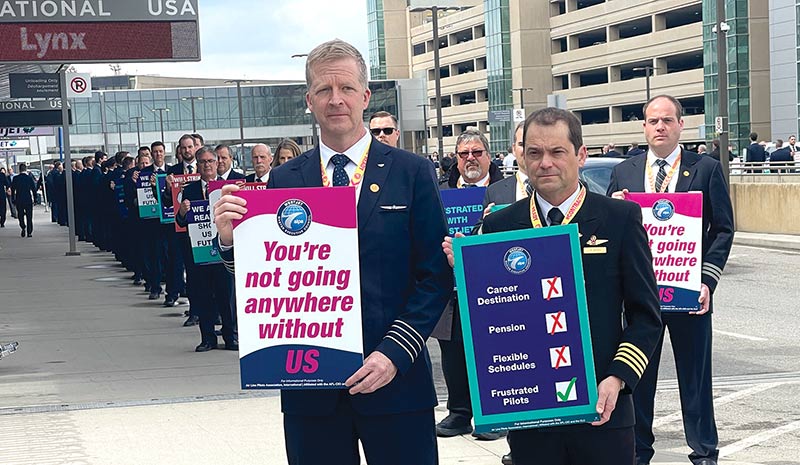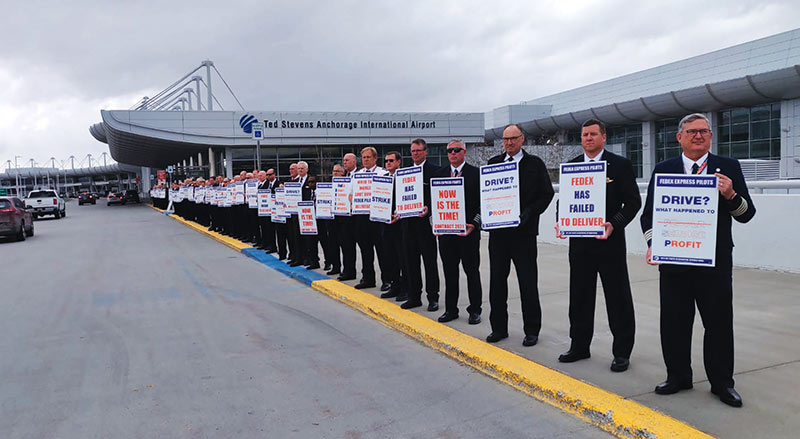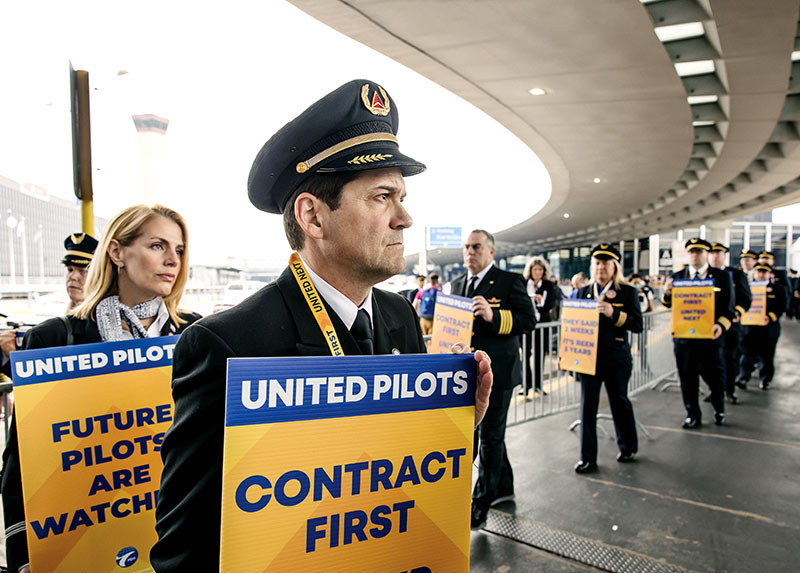Pilot Group News
Updates from WestJet, Calm Air, FedEx Express, United, and Air Transport Int'l

WestJet pilots, along with Capt. Jason Ambrosi, ALPA’s president, front right, picket in Calgary, Alb., on May 8, sending a strong message to management that they’re committed to reaching an industry-standard agreement.
WestJet Pilots File 72-Hour Strike Notice
At 8:00 p.m. on May 15, WestJet pilots issued a 72-hour strike notice to WestJet management and the government. This started the clock on a 72-hour countdown to negotiate a fair and equitable contract before the pilots can legally utilize all options available to them under the Canada Labour Code.
The pilots could have filed the notice over the prior weekend, but, in a bid to keep the airline operating, agreed to extend negotiations. This sign of good faith was to allow enough time to review additional proposals put forth by both parties. While progress was made on most noncost items, the pilots and management were unable to reach an agreement that would serve the best interests of the parties involved.
“After nine months of negotiating, management still fails to understand today’s labour market conditions, leading to a mass exodus of our pilots in search of better work opportunities—and more will follow if this agreement doesn’t meet our pilots’ needs,” said Capt. Bernard Lewall, the pilots’ Master Executive Council chair. “Without the economic and job-security improvements our pilots require, WestJet will be parking airplanes, as it won’t have enough pilots to operate them or accomplish its own growth strategy.”
As of 3:00 a.m. eastern time on May 19, as Air Line Pilot went to press, WestJet pilots planned to begin a lawful job action, which could include grounding all aircraft and effectively shutting down operations.
“Flight disruptions are never an ideal outcome, especially given the tremendous support our guests have shown us, and we want to continue being a major contributor to our company’s success by helping WestJet realize its growth strategy,” noted Lewall. “However, WestJet pilots will withdraw our services to secure a contract that will fix many of the airline’s labour problems and make it a career destination for pilots once again.”
On average, a WestJet Group of Companies pilot leaves every 18 hours—mostly to fly for WestJet’s competitors. Negotiators continued to make proposals that would go a long way toward rectifying WestJet’s pilot attraction and retention crisis by seeking better job security, industry-standard pay, and more flexible schedules to allow for a better work-life balance—consistent with collective agreements that other ALPA-represented pilot groups are signing with their employers. ALPA’s more than 69,000 pilots stand behind the WestJet pilots as they ready themselves for possible legal job action.
“We’re hopeful today’s strike notice filing will provide management with the incentive to recognize just how dire the situation is and reach an agreement with us,” continued Lewall. “That’s why we’ll continue to make our negotiators available 24/7 during the remainder of the 72-hour strike notice period.”
[Editor's note: After this issue of Air Line Pilot went to press and right before the strike notice clock expired, the WestJet pilots reached an agreement-in-principle with management.]
Calm Air Pilots Ratify Agreement with Compensation and Quality-of-Life Improvements
On April 18, Calm Air pilots announced that they ratified a new five-year employment contract with pay increases, stronger job-security protections, and quality-of-life improvements.
Of the 82 percent of eligible pilots who cast ballots, 80 percent voted in favour of the agreement, which will expire on April 30, 2028. The new contract includes enhancements to ensure the airline retains its experienced pilots and attracts new ones as growth continues.
“We’re proud of what we’ve accomplished by negotiating a fair and equitable contract that works for both Calm Air pilots and our company,” said Capt. Brendan Potter, the pilots’ Master Executive Council chair.
Negotiations took just a matter of weeks before ALPA and the airline’s negotiators were able to agree to terms, thanks to the positive working relationship between the pilot group and management.
“Additional changes to work conditions and compensation reaffirm that Calm Air is a career destination,” said Potter. “This new contract is a win for both the pilots and the company because it provides our members positive gains while helping the airline remain competitive.”
FedEx Pilots Vote Overwhelmingly to Authorize a Strike

FedEx pilots picket in Anchorage, Alaska, on May 10, demonstrating their commitment to achieve an agreement that represents the pilots’ contributions to FedEx.
On May 17, FedEx Express pilots announced they voted overwhelmingly in support of a strike, if necessary. With more than 97 percent of members participating, 99 percent of the pilots authorized union leaders to call a strike, if needed, to achieve a new contract. The pilots’ contract became amendable in November 2021, with negotiations beginning in May 2021. Talks entered mediation in October 2022.
“Today, FedEx pilots spoke with one unified voice and sent a clear message to management that we’re willing to go the distance to secure a new contract,” said Capt. Chris Norman, the pilots’ Master Executive Council chair. “Now is the time for FedEx to deliver a new contract that reflects the value we bring to FedEx as highly skilled professionals who deliver FedEx’s Purple Promise every day. Our goal is to reach an agreement, not to strike. The ball is in management’s court, and it’s time for the company to get serious at the bargaining table and invest in our pilots.”
Before a strike can take place, the National Mediation Board must first decide that additional mediation efforts wouldn’t be productive and offer the parties an opportunity to arbitrate the dispute. If either side declines the arbitration, both parties enter a 30-day cooling-off period, after which the parties can engage in self-help—a strike by the union or a lockout by management.
On May 10, FedEx pilots held an informational picket in Anchorage, Alaska, sending a unified message to management that they’re ready to conclude negotiations. “We remain steadfast in our commitment to achieve an agreement that represents our contributions to FedEx,” Norman said.
Thousands of United Pilots Demand Fair Treatment and Modern Contract During Nationwide Picket

United pilots, along with Capt. Jason Ambrosi, ALPA’s president, front right, informational picket at Chicago O’Hare International Airport to show their resolve to negotiate an industry-leading contract.
Approximately 3,000 United pilots, joined by Capt. Jason Ambrosi, ALPA’s president; fellow ALPA pilots; and union supporters, stood shoulder to shoulder in a coast-to-coast picketing event on May 12 to make their voices heard as management shows no significant movement to modernize their antiquated contract. The pilots protested management’s refusal to recognize the vital role they play in their company’s success.
“I’m proud to stand here today to send United Airlines management a message that the airline’s pilots have the full backing of their international union in their fight for the contract they’ve earned,” said Ambrosi. “United management needs to stop slow rolling negotiations that have dragged into their fifth year and do the right thing for their pilots.”
“United pilots will always be there for our customers,” said Capt. Garth Thompson, the pilot group’s Master Executive Council chair. “Unfortunately, the same can’t be said about management, which seems to think that a last-minute cancellation of a United pilot’s scheduled day off, or abrupt trip reassignments that extend into planned days off, is acceptable for a United pilot’s family. This is an example of how this old pilot contract impacts our ability to maintain a healthy work-life balance,” Thompson remarked. “United pilots will deal with this adversity in our usual professional and safe manner. We’ll continue to work in 2023 despite staffing shortages in air traffic control facilities, aggressive summer schedules, capacity constraints, and weather. And most importantly, United pilots want the company and the public to know that the bold ‘United Next’ growth plans can’t work without an updated pilot contract.
“Today’s nationwide picket was a resounding success,” Thompson added. “This isn’t just about pilots; it’s about the future of United Airlines. We believe that United has the potential to be the biggest and best world-class airline, and we’re committed to helping the company achieve its goals.”
ATI Pilots Call on Management to Acknowledge Staffing Concerns
In advance of Air Transport Services Group’s (ATSG) first quarterly earnings release, the pilots of Air Transport International (ATI), are calling on management to acknowledge how unprecedented labor concerns may affect their customers and future revenue.
“ATSG management likely won’t address the unprecedented pilot attrition at ATI, but on the line every day we see and feel the impact the staffing imbalance is having on our reliability, which our customers count on,” said Capt. Mike Sterling, the pilots’ Master Executive Council chair, on May 3.
“ATI pilots are committed to making the airline a career destination and want to support our customers, but management is unwilling to come to a new pilot agreement that will facilitate this level of commitment. We’ve made it very clear that a market-based contract that acknowledges the value we deliver to our customers, ATI, and ATSG is needed to retain and attract pilots.
“Just as critical are the resources needed to continue to provide the superior level of service our customers have come to expect. The current unsustainably fatiguing schedules, inconsistent pay, overworked support staff, increased contract violations, training difficulties, and schedules that damage our quality of life are all catalysts for pilots leaving.
“Our management teams have the ability to stem the flow of highly qualified pilots by reaching a fair and equitable contract agreement. ATI pilots don’t want to leave but are finding better career opportunities elsewhere,” Sterling remarked.
The airline employs approximately 550 pilots. A record 126 pilots left in 2022. Pilot attrition is expected to increase in 2023, with 78 departures as of April 21.
Currently, the airline is utilizing a visa program to hire foreign pilots to bolster pilot ranks, a measure that’s unlikely to maintain, much less grow, its continuously dwindling staffing levels.

